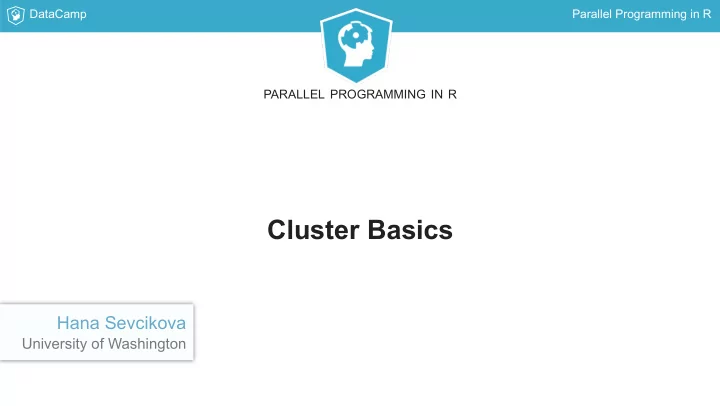

DataCamp Parallel Programming in R PARALLEL PROGRAMMING IN R Cluster Basics Hana Sevcikova University of Washington
DataCamp Parallel Programming in R
DataCamp Parallel Programming in R
DataCamp Parallel Programming in R
DataCamp Parallel Programming in R Supported backends Sock et communication (default, all OS platforms) cl <- makeCluster(ncores, type = "PSOCK") Workers start with an empty environment (i.e. new R process).
DataCamp Parallel Programming in R Supported backends Fork ing (not available for Windows) cl <- makeCluster(ncores, type = "FORK") Workers are complete copies of the master process.
DataCamp Parallel Programming in R Supported backends Using the MPI library (uses Rmpi) cl <- makeCluster(ncores, type = "MPI")
DataCamp Parallel Programming in R PARALLEL PROGRAMMING IN R Let's practice!
DataCamp Parallel Programming in R PARALLEL PROGRAMMING IN R The core of parallel Hana Sevcikova University of Washington
DataCamp Parallel Programming in R Core Functions Main processing functions: clusterApply clusterApplyLB Wrappers: parApply, parLapply, parSapply parRapply, parCapply parLapplyLB, parSapplyLB
DataCamp Parallel Programming in R clusterApply: Number of tasks clusterApply(cl, x = arg.sequence, fun = myfunc) length(arg.sequence) = number of tasks (green bars)
DataCamp Parallel Programming in R Parallel vs. Sequential Not all embarrassingly parallel aplications are suited for parallel processing. Processing overhead: Starting/stopping cluster Number of messages sent between nodes and master Size of messages (sending big data is expensive) Things to consider: How big is a single task (green bar) How much data need to be sent How much gain is there by running it in parallel ⟶ benchmark
DataCamp Parallel Programming in R PARALLEL PROGRAMMING IN R Let's practice!
DataCamp Parallel Programming in R PARALLEL PROGRAMMING IN R Initialization of Nodes Hana Sevcikova University of Washington
DataCamp Parallel Programming in R Why to initialize? Each cluster node starts with an empty environment (no libraries loaded). Repeated communication with the master is expensive. Example: clusterApply(cl, rep(1000, n), rnorm, sd = 1:1000) Master sends a vector of 1:1000 to all n tasks ( n can be very large). Good practice: Master initializes workers at the beginning with everything that stays constant or/and is time consuming. Examples: sending static data loading libraries evaluating global functions
DataCamp Parallel Programming in R clusterCall Evaluates the same function with the same arguments on all nodes. Example: cl <- makeCluster(2) clusterCall(cl, function() library(janeaustenr)) clusterCall(cl, function(i) emma[i], 20) [[1]] [1] "She was the youngest of the two daughters of a most affectionate," [[2]] [1] "She was the youngest of the two daughters of a most affectionate,"
DataCamp Parallel Programming in R clusterEvalQ Evaluates a literal expression on all nodes (equivalent to evalq() ) Example: cl <- makeCluster(2) clusterEvalQ(cl, { library(janeaustenr) library(stringr) get_books <- function() austen_books()$book %>% unique %>% as.character }) clusterCall(cl, function(i) get_books()[i], 1:3) [[1]] [1] "Sense & Sensibility" "Pride & Prejudice" "Mansfield Park" [[2]] [1] "Sense & Sensibility" "Pride & Prejudice" "Mansfield Park"
DataCamp Parallel Programming in R clusterExport Exports given objects from master to workers. Example: books <- get_books() cl <- makeCluster(2) clusterExport(cl, "books") clusterCall(cl, function() print(books)) [[1]] [1] "Sense & Sensibility" "Pride & Prejudice" "Mansfield Park" [4] "Emma" "Northanger Abbey" "Persuasion" [[2]] [1] "Sense & Sensibility" "Pride & Prejudice" "Mansfield Park" [4] "Emma" "Northanger Abbey" "Persuasion"
DataCamp Parallel Programming in R PARALLEL PROGRAMMING IN R Let's practice!
DataCamp Parallel Programming in R PARALLEL PROGRAMMING IN R Subsetting data Hana Sevcikova University of Washington
DataCamp Parallel Programming in R Data chunks Each task applied to different data (data chunk) Data chunks are passed to workers as follows: 1. Random numbers generated on the fly 2. Passing chunks of data as argument 3. Chunking on workers' side
DataCamp Parallel Programming in R Data chunk as random numbers myfunc <- function(n, ...) mean(rnorm(n, ...)) clusterApply(cl, rep(1000, 20), myfunc, sd = 6)
DataCamp Parallel Programming in R Data chunk as argument Dataset is chunked into several blocks on master Each block passed to worker via an argument Incorporated into higher level functions ( parApply() etc) cl <- makeCluster(4) mat <- matrix(rnorm(12), ncol=4) [,1] [,2] [,3] [,4] [1,] 1.1540263 -2.180922 0.5322614 0.5578128 [2,] -1.8763588 -1.625226 0.4058091 -0.5532732 [3,] -0.1685597 -1.089104 0.1770636 0.5483025 Sum of columns ( colSums(mat) ): parCapply(cl, mat, sum) unlist(clusterApply(cl, as.data.frame(mat), sum)) Sends each worker a column of mat
DataCamp Parallel Programming in R Chunking on workers' end Example of matrix multiplication M × M : n <- 100 M <- matrix(rnorm(n * n), ncol = n) clusterExport(cl, "M") mult_row <- function(id) apply(M, 2, function(col) sum(M[id,] * col)) clusterApply(cl, 1:n, mult_row) %>% do.call(rbind, .)
DataCamp Parallel Programming in R PARALLEL PROGRAMMING IN R Let's practice!
Recommend
More recommend